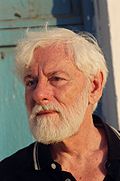"Eretz Israel, from the sea to the Jordan, belongs to us!" declare right-wing Israelis on every occasion.
The two statements seem to be the same, with only the name of the country changed.
But if you read them again carefully, there is a slight difference. The direction.
FROM THE sea to the river, from the river to the sea.
Therein lies much more significance than meets the eye. It shows how the speaker sees himself -- coming from the East or from the West.
When one says "from the river to the sea," one sees oneself as belonging to the extensive region known to Westerners as the "Middle East," a vital part of the Asian continent. The term "Middle East" is, itself, a patronizing expression with colonial undertones -- it suggests that the area has no independent standing. It exists only in relation to a far-away world center -- Berlin? London? Washington?
When one says "from the sea to the river," one sees oneself as coming from the West and living as a bridgehead of the West, facing a foreign, and probably hostile, continent.
In its long recorded history, going back many thousands of years, this country -- whether Canaan, Palestine or Eretz Israel -- has seen many waves of invaders who came to settle here.
Most of these waves came from the hinterland. Canaanites, Hebrews, Arabs, and many others came from the East. They settled here, mingled with the existing population and were soon absorbed, creating new mixtures and establishing natural relations with the neighboring countries. They fought wars, made peace, prospered, suffered in times of drought.
The ancient Israelite kingdoms (not the mythical ones of Saul, David and Solomon but the real historical ones of Ahab and his successors) were a natural part of this environment, as witnessed by contemporary Assyrian and other documents.
So were the Arab invaders of the 7th century. They settled among the locals. These very slowly converted from Christianity and Judaism to Islam, adopted the Arabic language and became "Arabs," much as the Canaanites before them had become "Israelites."
QUITE DIFFERENT was the way of those invaders who came from the West.
There were three waves: the Philistines in antiquity, the Crusaders in the Middle Ages and the Zionists in modern times.
Coming from the West (even if, like the first Crusaders, overland) the invader sees the vast enemy continent before him. He clings to the shore, establishes a bridgehead and advances to enlarge it. Significantly, no "western" invader ever established borders -- they advanced or retreated as their forces and circumstances decreed.
This historical picture applies, of course, only to those invaders who came and settled in the country. It does not concern the invading empires which just wanted to control the area. They came from all directions and moved on -- Hittites and Egyptians, Assyrians and Babylonians, Persians and Greeks, Romans and Byzantines, Arabs and Mongols, Turks and British. (The Mongols came here after destroying Iraq, and were beaten decisively by the Muslim general Baybars, heir of Saladin, in one of the most decisive battles in history.)
Eastern Empires usually continued through Egypt to the West, turning North Africa into a Semitic sphere. Western Empires continued to the East, towards India.
(Note: You can view every article as one long page if you sign up as an Advocate Member, or higher).






